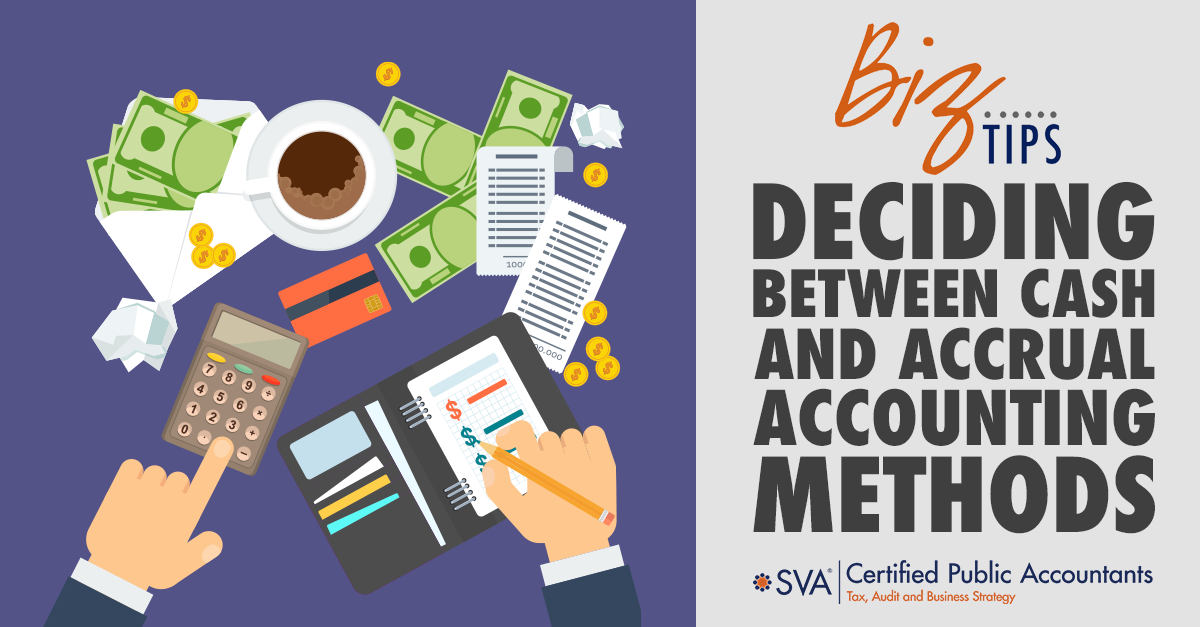Small businesses may start off using the cash-basis method of accounting. But many eventually convert to accrual-basis reporting to conform with U.S. Generally Accepted Accounting Principles (GAAP).
Which Method is Right for You?
Cash Method
Under the cash method, companies recognize revenue as customers pay invoices and expenses when they pay bills. As a result, cash-basis entities may report fluctuations in profits from period to period, especially if they’re engaged in long-term projects. This can make it hard to benchmark a company’s performance from year to year — or against other entities that use the accrual method.
Businesses that are eligible to use the cash method of accounting for tax purposes can fine-tune annual taxable income. This is accomplished by timing the year in which you recognize taxable income and claim deductions.
Normally, the preferred strategy is to postpone revenue recognition and accelerate expense payments at year-end. This strategy can temporarily defer the company’s tax liability. But it makes the company appear less profitable to lenders and investors.
Conversely, if tax rates are expected to increase substantially in the coming year, it may be advantageous to take the opposite approach — accelerate revenue recognition and defer expenses at year-end. This strategy maximizes the company’s tax liability in the current year when tax rates are expected to be lower.
Accrual Method
The more complex accrual method conforms to the matching principle under GAAP. That is, companies recognize revenue (and expenses) in the periods that they’re earned (or incurred). This method reduces major fluctuations in profits from one period to the next, facilitating financial benchmarking.
In addition, accrual-basis entities report several asset and liability accounts that are generally absent on a cash-basis balance sheet. Examples include prepaid expenses, accounts receivable, accounts payable, work in progress, accrued expenses, and deferred taxes.
Public companies are required to use the accrual method. But small companies have other options, including the cash method.
(Download Video Transcript)
Tax Considerations
Thanks to the Tax Cuts and Jobs Act (TCJA), more companies are eligible to use the cash method for federal tax purposes than under prior law. In turn, this change has caused some small businesses to rethink their method of accounting for bookkeeping purposes.
The TCJA liberalized the small business definition to include those that have no more than $25 million of average annual gross receipts, based on the preceding three tax years. This limit is adjusted annually for inflation. For tax years beginning in 2021, the inflation-adjusted limit is $26 million. For 2022, it’s $27 million. Under prior law, the gross-receipts threshold for the cash method was only $5 million.
In addition, for tax years beginning after 2017, the TCJA modifies Section 451 of the Internal Revenue Code so that a business recognizes revenue for tax purposes no later than when it’s recognized for financial reporting purposes. So, if you use the accrual method for financial reporting purposes, you must also use it for federal income tax purposes.
For More Information
There are several viable reasons for a small business to switch to the accrual method of accounting. It can help reduce variability in financial reporting and attract financing from lenders and investors who prefer GAAP financials.
But, if you’re eligible for the cash method for tax purposes, you may want to switch to that method for the simplicity and the flexibility in tax planning it provides.
Contact us to discuss your options and pick the optimal method for your situation.
© 2022

